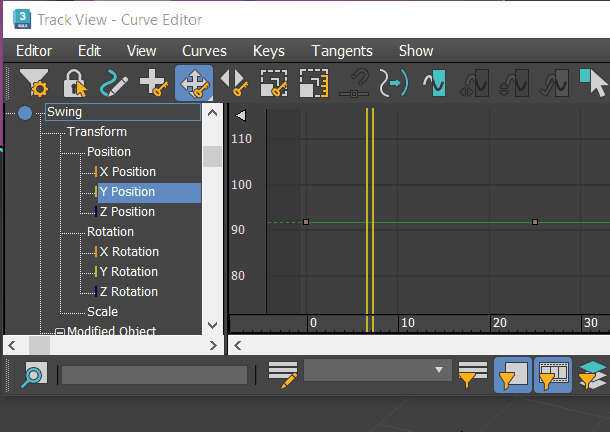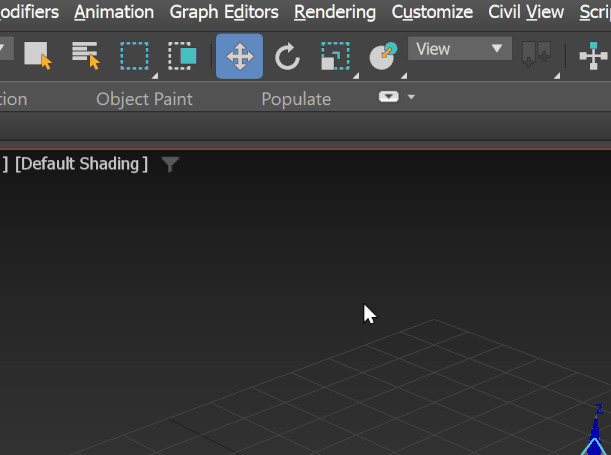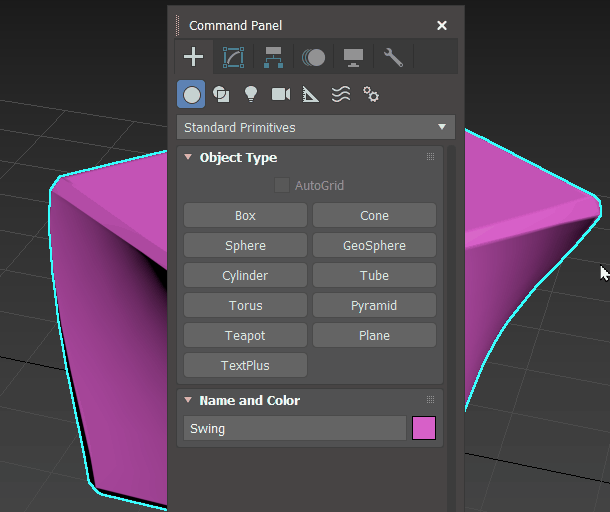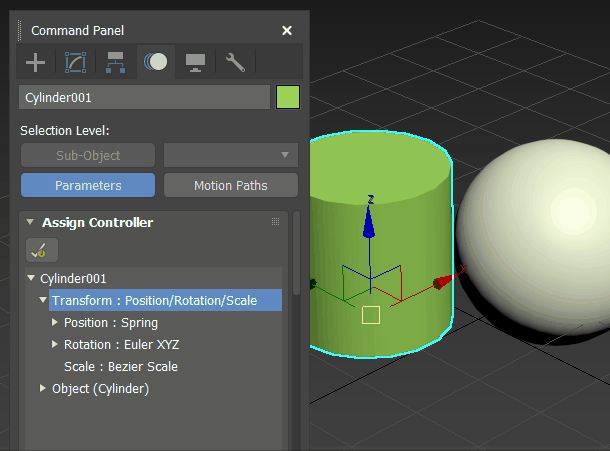Every parameter has a default controller type that gets assigned the moment the parameter is animated. You can choose from multiple controller types for any parameter and change controllers after the parameter is animated.
Assigning Controllers in Track View

Assigning an Animation Controller using the Track View (Curve Editor)
One way to assign a controller to any animatable parameter in the Track View Hierarchy List by highlighting track names and then choosing Assign Controller on the Edit menu  Controller submenu. Other methods are covered in
Assign Controller.
Controller submenu. Other methods are covered in
Assign Controller.
You can assign the same controller type to a selection of multiple parameters as long as all selected parameters can use the same type of controller. For example, you could select the Length, Width, and Height parameters for multiple Box objects and assign the same controller type to them. This is because they all use controllers that work on floating-point data.
If a parameter is already animated, then assigning a new controller has one of the following effects:
- The existing animation values are recalculated to produce a similar animation with the new controller. For example, replacing TCB Position with Bezier Position closely preserves the animation.
- The existing animation values are discarded. For example, replacing Smooth Rotation with Noise Rotation discards the Smooth Rotation animation values.
Assigning Controllers Using the Animation Menu

Assigning an Animation Controller using the Animation menu
When you assign a controller this way, a List controller is automatically assigned, and the controller you assigned appears as the first entry in the list. This automatic List controller assignment does not occur if you assign controllers using the Motion panel or Track View. Weighted list controllers allow you to blend between various tracks by animating the weights.
Assigning Controllers in the Motion Panel

Assigning an Animation Controller using the Motion Panel
You can also assign controllers in the Motion panel, which contains special tools for working with transform controllers. Motion panel controllers have many of the same controller functions as the Curve Editor, plus controls necessary for working with special controllers such as IK Solvers.
Using the Motion panel you can view and work with the transform controllers of a single selected object.
- Select an object.
- In the
 Motion panel, expand
Assign Controller.
Motion panel, expand
Assign Controller.
- Highlight a Transform in the list. The
 (Assign Controller) button appears.
(Assign Controller) button appears.
- Click
 (Assign Controller) to open the Assign Controller rollout.
(Assign Controller) to open the Assign Controller rollout.
- Double click a controller in the Assign Controller rollout to apply it to the selected transform.
Copying and Pasting Controllers
Rules for using Copy and Paste
- You can copy only single controllers. Compound controllers like List or PRS Transform controllers are considered single controllers for Copy and Paste operations.
- You can paste a copied controller into one or more controllers using the same data type.
- You can choose to make an instance or a copy of the pasted controller.
- You can choose to convert other controller instances in the scene automatically.
- Motion Panel Assign Controller Rollout
-
In the Motion Panel Assign Controller Rollout, right-click the controller and select Copy from the context menu, then right-click the controller and choose Paste. You can also

Copying a controller from one object to another.
Tip: You can access Wire parameters from the Motion Panel Assign Controller context menu and copy them using the Paste - Wire option. - See Rules for using Copy and Paste, above.
- Track View
-
Right-click any blank area on the Track View toolbars, then choose Show Toolbars
 Controllers: Track View. This displays the Controller toolbar with buttons for quick access to controller tools.
Controllers: Track View. This displays the Controller toolbar with buttons for quick access to controller tools.
 Click Copy and Paste on the Track View toolbar to copy and paste controllers. For a general discussion of using Copy and Paste, see
Copying and Pasting Items.
Click Copy and Paste on the Track View toolbar to copy and paste controllers. For a general discussion of using Copy and Paste, see
Copying and Pasting Items.
- Curve Editor
-
Select the controller track to copy, then right-click and choose Copy from the Track View quad menu. Navigate the Hierarchy list to the target object, select the track, right-click, and choose Paste.
Clicking Paste displays the Paste dialog, with three controls for determining how the Paste operation is carried out.
- Copy
-
Pastes the controller as a copy.
- Instance
-
Pastes the controller as an instance of the source controller. Any change you make to either controller will affect the other.
For example, you can paste a box's Length controller as an instance into its Height and Width parameters. This makes the box a cube. Changing either of the Length, Width, or Height parameters changes the other two.
- Paste Target: Replace All Instances
-
When selected, all instances of the target controller receive the paste controller, whether they are selected or not. This keeps all instances of the target controller as instances. When off, the target controller is made unique and the remaining instances are unchanged.
Editing Existing Controllers
To change settings for an existing controller, first highlight the controller in Track View or on the Motion panel, then right-click the controller to open the context menu. If the controller settings are editable, then the Properties command in the context menu will be available and you can choose it to open the relevant settings dialog.
